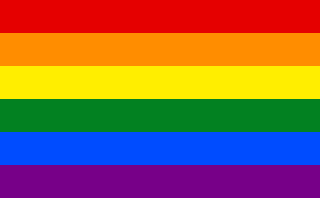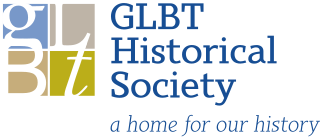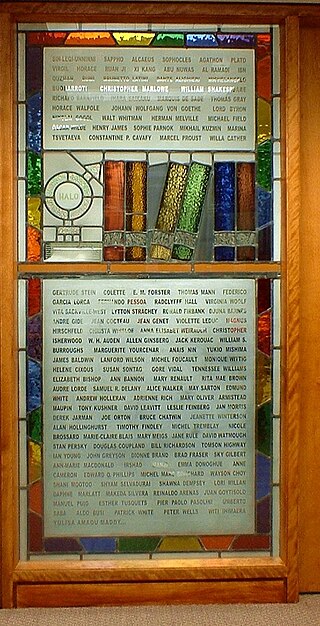
The LGBT community is a loosely defined grouping of lesbian, gay, bisexual, and transgender individuals united by a common culture and social movements. These communities generally celebrate pride, diversity, individuality, and sexuality. LGBT activists and sociologists see LGBT community-building as a counterweight to heterosexism, homophobia, biphobia, transphobia, sexualism, and conformist pressures that exist in the larger society. The term pride or sometimes gay pride expresses the LGBT community's identity and collective strength; pride parades provide both a prime example of the use and a demonstration of the general meaning of the term. The LGBT community is diverse in political affiliation. Not all people who are lesbian, gay, bisexual, or transgender consider themselves part of the LGBT community.

A pride flag is any flag that represents a segment or part of the LGBT community. Pride in this case refers to the notion of LGBT pride. The terms LGBT flag and queer flag are often used interchangeably.
Over the course of its history, the LGBT community has adopted certain symbols for self-identification to demonstrate unity, pride, shared values, and allegiance to one another. These symbols communicate ideas, concepts, and identity both within their communities and to mainstream culture. The two symbols most recognized internationally are the pink triangle and the rainbow flag.
Outfest is an LGBTQ-oriented nonprofit that produces two film festivals, operates a movie streaming platform, and runs educational services for filmmakers in Los Angeles. Outfest is one of the key partners, alongside the Frameline Film Festival, the New York Lesbian, Gay, Bisexual, & Transgender Film Festival, and the Inside Out Film and Video Festival, in launching the North American Queer Festival Alliance, an initiative to further publicize and promote LGBT film.

The Frameline Film Festival began as a storefront event in 1976. The first film festival, named the Gay Film Festival of Super-8 Films, was held in 1977. The festival is organized by Frameline, a nonprofit media arts organization whose mission statement is "to change the world through the power of queer cinema". It is the oldest LGBTQ+ film festival in the world.

The rainbow flag or pride flag is a symbol of LGBT pride and LGBT social movements. The colors reflect the diversity of the LGBT community and the spectrum of human sexuality and gender. Using a rainbow flag as a symbol of LGBT pride began in San Francisco, California, but eventually became common at LGBT rights events worldwide.

The GLBT Historical Society maintains an extensive collection of archival materials, artifacts and graphic arts relating to the history of LGBT people in the United States, with a focus on the LGBT communities of San Francisco and Northern California.
Lesbian, gay, bisexual, transgender (LGBT) affirming denominations in Judaism are Jewish religious groups that welcome LGBT members and do not consider homosexuality to be a sin. They include both entire Jewish denominations, as well as individual synagogues. Some are composed mainly of non-LGBT members and also have specific programs to welcome LGBT people, while others are composed mainly of LGBT members.

Lesbian, Gay, Bisexual, Transgender, and Queer Aggies is an officially recognized student group at Texas A&M University. Originally known as Gay Student Services (GSS) and later as Gay, Lesbian, Bisexual, and Transgender Aggies, the organization was officially recognized by Texas A&M University in 1985 after a lengthy court battle.

India has a vibrant LGBTQ culture, especially in its large cities due to growing acceptance in the recent years.

In the post-Stonewall era, the role of libraries in providing information and services to LGBTQ individuals has been a topic of discussion among library professionals. Libraries can often play an important role for LGBTQ individuals looking to find information about coming out, health, and family topics, as well as leisure reading. In the past 50 years, advocate organizations for LGBTQ content in libraries have emerged, and numerous theorists have discussed various aspects of LGBTQ library service including privacy concerns, programming, collection development considerations and librarian/staff education needs, as well as special services for juvenile and teen patrons.
Seattle has a notably large LGBT community, and the city of Seattle has protected gay and lesbian workers since the passage of the Fair Employment Practice Ordinance in 1973. Seattle's LGBT culture has been celebrated at Seattle Pride which began in 1977 as Gay Pride Week. Gay cabaret traveled in a circuit including Seattle and San Francisco since the 1930s. Seattle had gay-friendly clubs and bars since the 1930s including The Casino in Underground Seattle at Pioneer Square which allowed same-sex dancing since 1930, and upstairs from it, The Double Header, in continuous operation since 1933 or 1934 until 2015, was thought to be the oldest gay bar in the United States.

Intersex people are born with sex characteristics that "do not fit the typical definitions for male or female bodies". They are substantially more likely to identify as lesbian, gay, bisexual, or transgender (LGBT) than endosex people, an estimated 52% identifying as non-heterosexual and 8.5% to 20% experiencing gender dysphoria. Although many intersex people are heterosexual and cisgender, this overlap and "shared experiences of harm arising from dominant societal sex and gender norms" has led to intersex people often being included under the LGBT umbrella, with the acronym sometimes expanded to LGBTI. Some intersex activists and organisations have criticised this inclusion as distracting from intersex-specific issues such as involuntary medical interventions.
LGBT erasure refers to the tendency to remove lesbian, gay, bisexual, transgender, intersex, aromantic, asexual and queer groups or people intentionally or unintentionally from record, or to dismiss or downplay their significance. This erasure can be found in a number of written and oral texts, including popular and scholarly texts.
The National LGBTQ Wall of Honor is an American memorial wall in Greenwich Village, Lower Manhattan, New York City, dedicated to LGBTQ "pioneers, trailblazers, and heroes". The wall is located inside of the Stonewall Inn and is a part of the Stonewall National Monument, the first U.S. National Monument dedicated to LGBTQ rights and history. The first fifty nominees were announced in June 2019, and the wall was unveiled on June 27, 2019, as a part of the Stonewall 50 – WorldPride NYC 2019 events. Each year five additional names will be added.
Disability and LGBT identity both can play significant roles in the life of an individual. Disability and sexuality can intersect in compounding ways, and, for many people, being both disabled and LGBT can result in double marginizalization. The two identities, either by themselves or in tandem, can complicate questions of discrimination and access to resources like accommodations, support groups, and elder care.









